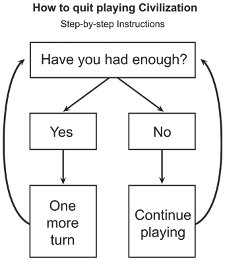Firaxis has given me a belated birthday gift by releasing Civilization VI. They've also ensured that I don't get very much productive done during the months of October and November this year, since I've been sinking a whole lot of time into "one more turn"-ing myself late into the night. I've barely scratched the surface of the newly-released Dark Souls III DLC, my Madden franchise has fallen behind, and I haven't even bothered buying recently-released games like the new Master of Orion. My board game collection has been collecting dust, and my Dungeons & Dragons campaigns have been on hiatus. I'll get back to all those things after one more turn.
Oozing with production quality
The first thing that stood out to me upon entering my first game was the artwork. It's a pretty stark contrast from Civilization V's visuals. Civ V favored a semi-photo realistic quality. Many screenshots of the game's map look like satellite photos, and units (though exceedingly large) looked and animated realistically. This created a lot of pretty screenshots (still images), but the game looked kind of static, washed-out, and dull in motion. VI, on the other hand, goes for an exaggerated, vibrant, and more cartoonish look that reminds me a lot more of Civ IV and Civ Revolution.
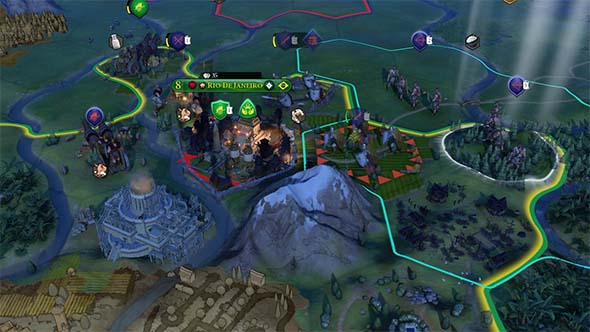
The graphics are vibrant and highly informative. Everything that you see on screen genuinely means something.
What I really like is how utilitarian the visuals are. Almost everything on the game map is communicating part of the state of the game to the player. You can see every piece of infrastructure in and around a city, as well as exactly which tiles are being worked, all without having to open a separate screen and without having to clutter the screen with extra UI icons. There's even different graphics to represent the different phases of a building or wonder's construction that tells you exactly what that city is currently constructing, and how close it might be to finishing that wonder. It's attractive, but it's also clean and informative.
The fog of war is also wonderfully functional and neat to look at. This game renders the fog of war with the style of a hand-drawn map on canvas (similar to Total War: Shogun 2, which I loved). Heck, there's even an animated day/night cycle that was seemingly added because ... why not?
Improvements have different graphics for when they're un-worked [LEFT] versus worked [RIGHT].
The rest of the game shows similarly high production quality. There's actual cinematics for the win screens instead of dialogue boxes with a static image. Finishing a wonder results in an in-game cutscene of that wonder's construction. It isn't quite as pretty as Civ IV's pre-rendered wonder movies, but makes up for it by providing a sense of context that makes me feel like I'm seeing "my Oracle" instead of just the Oracle. There's more historic quotes, all of which are narrated wonderfully by Sean Bean. Firaxis even brought back composer Christopher Tin for some of the music. The new theme music, "Sogno Di Volare" ["The Dream of Flight"] isn't as immediately catchy as "Baba Yetu", but it's still an uplifting, memorable track that stands out more than the menu themes of Civ V. Put simply, this game just looks and sounds terrific.
A more complete Civilization experience
All this production quality isn't just lipstick on a pig. Civ VI also feels very complete from a gameplay and mechanical perspective. Most of the game systems from Civ V have been transferred over, which means that this game doesn't have the gaping holes in design that vanilla Civ V shipped with. There's a fully-developed religion and espionage system this time around, and the popular trade route and archaeology mechanics from Civ V are also retained, but each has been tweaked with Civ VI's design goals in mind.
Back to empire-management
Where this game is a little bit more experimental (and revolutionary) is with its city and empire-management systems. Civ V introduced the hex grid and made unit movement and combat actually use the game's map and terrain. Well now that same "unstacking" philosophy has been applied to cities as well. A city isn't just one, giant, bucket of buildings that exists on a single tile anymore. City infrastructure must now be built on the map in the form of "districts". Each district has a theme (there's a science district, a faith district, an economic district, and so on), and each has certain restrictions on where it can be placed and bonuses for placing it in certain places. Many districts get bonuses for being adjacent to terrain features or to other districts, which means that the placement of these districts is actually meaningful. You have to plan out your city expansion well in advance in order to get the most out of any one city.
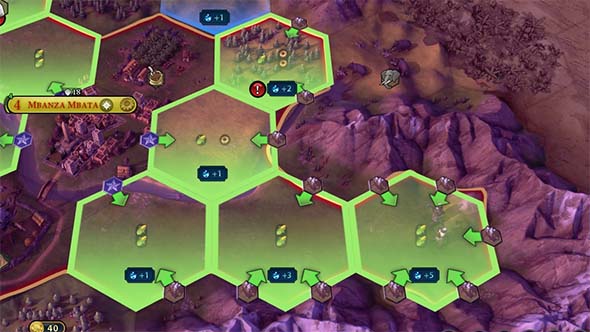
Districts have restrictions and bonuses based on terrain and other districts, which makes planning important.
This has the effect of adding a little bit of a city-builder quality to the game, as you effectively "zone" certain types of buildings and infrastructure and assign people to work them. It also means that the game will be loaded with tough decisions and trade-offs. Should I tuck a campus next to those mountains, or should I go with a Holy Site? Would I rather save that "breathtaking" tile for a neighborhood or national park later in the game? Should I harvest that resource that's sitting in the perfect spot for a Theater District? It helps to emphasize that this Civilization game isn't just a war-game (which vanilla Civ V often felt like); it's a full-fledged empire-builder.
This sense of building an empire is augmented by the new civics system that includes governments and policies. These aren't permanent social policies like in Civ V, which means that if your goals change and you need to pivot your civilization towards a new strategy, you have the means to customize your government and society for that new purpose. More advanced governments offer more policy slots, and each government has its own unique bonus that it confers. You can change your government and policies whenever you develop a new civic, and you can also spend gold to force a change in the interim if some emergency pops up. This all introduces a greater deal of flexibility that allows the player to adjust your empire dynamically based on emerging threats, problems, or opportunities. I just wish that two of the three medieval governments weren't both located along the same religious path of the civics tree.
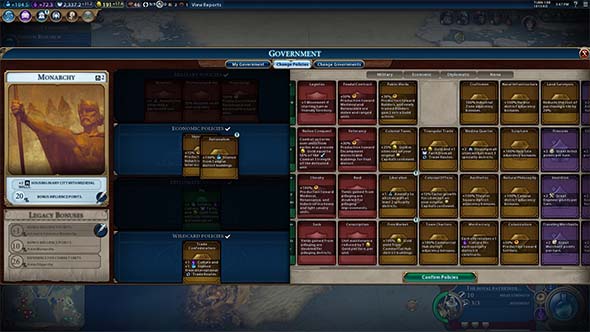
Policies can be swapped-out wholesale whenever you unlock a new one.
My only major complaint is that the ability to switch governments and policies comes a bit too frequent. It allows for a lot of switching back and forth between a select few policies depending on specific situations. The one thing that Civ V's social policies did very well was that the permanence of those choices made those policies feel like a fundamental aspect of your growing civilization's very identity. Even Civ IV's civics felt more semi-permanent than these ones, since there was a significant cost to changing your chosen civics. Chosing to pivot your civilization in a new direction, therefore, felt like a much more meaningful decision that had to be carefully thought-out. That isn't so much the case anymore, and policies can be swapped in and out much more willy-nilly. Governments at least have unique bonuses that strengthen over time, so you're incentivised to stick with a government. Overall, I think the flexibility that the civics and policies allows is a net positive for the game, and careful planning and use of policy-switching will likely become a major component of high-level, competitive play.
A nation shaped by geography and history
Perhaps the biggest influence that the new city districts has on the look and feel of the game is in how it makes civilizations feel much more like their development is influenced by the geography of the region of the world that they inhabit. City-builders like Cities: Skylines have already been very successful at making the geography of the map feel intrinsically important to the growth of your city, but this is the first time that I've seen a similar effect from a 4x strategy game. Although, it is worth noting that the Civilization board game from Fantasy Flight actually has analogous uses of the underlying map geography. I wonder if that game provided Firaxis with any inspiration?
It isn't just a matter of positioning your city to maximize the number of resources within workable range anymore. You're now also looking for mountain ranges or jungles for your campuses, forests for your holy sites, open space to place wonders and theater districts in clumps that buff each other, a coastal city where you can build a commercial hub along a river delta and adjacent to a harbor, and so on. You might even consider "harvesting" nearby resources in order to gain a one-time lump sum benefit in order to clear out the tile to build a district.
Heck, even deserts and tundra don't feel like completely dead space anymore, since you can use those unproductive tiles for your districts (which don't provide yield from the underlying terrain). The one area of the map that feels stale is the oceans. Beyond Earth's Rising Tide expansion found a way to make oceans a much more relevant part of the map, but without the floating cities of that futuristic setting, oceans have regressed to being mostly just dead space between continents. The limited real estate also means that island cities are probably going to end up being impractical to the point of non-viability, and coastal cities suffer a severe lack of production. I'm not really sure what Firaxis could have done with oceans, so I guess I can't blame them. In any case, the map feels like a much more relevant and active component of your strategy.
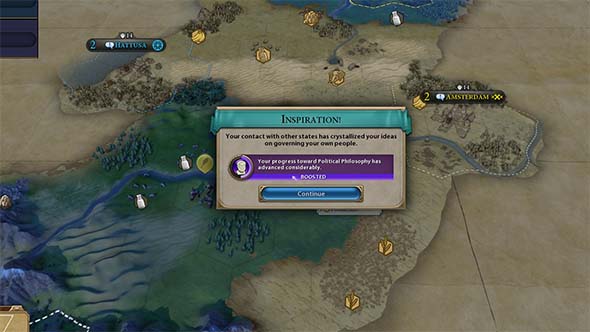
Certain in-game actions will trigger Eureka boosts towards relevant technologies or civics.
This is especially true with the new "Eureka" feature. Certain in-game actions and events can now provide you with a bonus towards relevant technologies or civics. This has the effect of turning the entire tech and civic trees into a large set of mini-side-quests. Which resources are available to you (and which you chose to improve or harvest), the proximity to the ocean, the presence of mountains, forests, or jungles, the location of other civilizations and city states, and so on can all contribute towards Eureka boosts that will give your civilization head starts in certain relevant areas of technological and cultural development. For example, finding your first natural wonder will give you a bonus towards researching early-game religious technologies, which can help you get a religious district built more quickly, which, in turn, will help you found a pantheon earlier, which will trigger another eureka boost for an early religious-themed civic that unlocks a policy that speeds up the acquisition of a prophet that can be used to upgrade your pantheon into a full religion.
It feels much more like the development of your civilization is influenced by its own history and actions, which is an excellent augmentation to the already-excellent sense of historical context that the Brave New World expansion's archaeology mechanic added to Civ V. Much like with policy-switching, I also suspect that careful micro-management of Eureka boosts will become a strong component of high-level play.
Roughing it
The focus on cities and governments doesn't mean that units and combat have been neglected. Unit management and combat have also changed considerably - mostly for the better. The first change that you'll likely notice is the new movement rules regarding rough terrain. Units must now spend the cost to enter a tile before entering it. So if you only have one movement point left, you cannot move into that adjacent forest or cross that river. This has the effect of dramatically slowing down units. You can't walk across flat land and end your turn on a hill or forest in order to basically ignore the movement penalties of the terrain.
This change is more realistic, but it can also be very frustrating at times. Trying to chase down barbarians or enemy units that retreat across rivers or into rough terrain feels like much more of a time-wasting chore. And if your slinger gets a barb bastard down to 1HP, but then he runs away into a jungle, you can forget about that eureka for the archery tech.
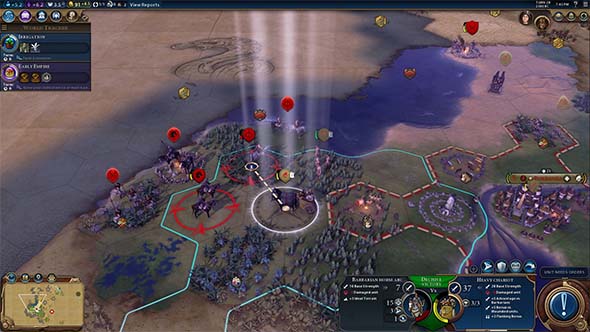
Stricter movement rules make mounted units feel more strategically valuable.
On the other hand, I think these rules may have been designed to make cavalry and other fast units more valuable. Using fast units to surround your enemy isn't only useful for gaining flanking bonuses anymore; it's also sometimes necessary to cut off an opponent's escape routes and to pursue them. Mounted units have a mixed history in Civ V. In vanilla release, people complained about them being too strong. So Firaxis nerfed them and applied penalties to attacking cities. Then people complained about them being too weak (other than a handful of unique horse units that were total badasses). What I like about this design in Civ VI is that these movement rules give mounted units more of a unique role that parallels their actual tactical role in real-life historical combat. Firaxis made these units more valuable for the way that they can overcome terrain limitations, rather than having to arbitrarily pump up their combat strength or movement speed.
The unstacking of cities also means that you can apply more precision strikes to your military endeavors by attacking specific infrastructure. Is a rival beating you in culture or science, but you don't really want to capture their cities? Declare war and pillage their theater and campus districts! You can't pillage wonders though, which would have been an interesting wrinkle in the game's military strategy.
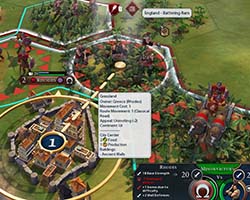
Support units can stack with other military units.
I'm also pleased with how the new promotion and "insta-heal" work. The insta-heal in Civ V was one of my biggest pet peeves in that game, but it doesn't bother me nearly as much now. Instead of being its own separate promotion, all units automatically insta-heal 50 HP whenever they take a promotion. The drawback is that taking a promotion counts as an action and ends the unit's turn. This means that you can't insta-heal and counter-attack on the same turn. This necessitates that the player be able to save promotions for later turns, and it means that you'll likely have to run away in order to insta-heal, rather than being able to do it on the front-lines.
The A.I.s still love to clutter up the board with swarms of religious units that can get in the way of your own unit-movement, and is very obnoxious. But other types of unit clutter have been significantly reduced. Certain "support" units (such as siege towers, anti-air guns, and so on) can now be stacked with a military escort and provide passive buffs to other nearby units. Later in the game, you'll also unlock the ability to group multiple units into a single corp or army that creates a single, super-charged unit. This alleviates some of the problems with large carpets of armies being unwieldly later in the game. This isn't exactly something new, as older versions of Civ allowed for similar features, but it feels more valuable this time around, since real estate is at a premium and you can't otherwise stack units. Even the reworking of Workers into expendable Builders helps to minimize the unit clutter, while keeping decision-making front-and-center. You can't coast off of a handful of workers that you built in the beginning of the game, and which eventually become idle clutter. Instead, you'll have to continually re-invest in new Builders as you acquire new territory or develop new ways to improve your terrain. You also should be more judicious with which improvements you build, and where you build them, since you don't want to waste a valuable Builder charge for an improvement that you're just going to replace with a district anyway.
Civilians, great people, and embarked units can all have military escorts attached to them, but traders sadly can't.
A last little addition is that you can now attach a military unit to a civilian unit as an escort. The two units will then move as one until you separate them, which reduces some micro-management. Unfortunately, you can't attach escorts to trade units, which move automatically and are the one thing that is most in need of an escort function! This is probably a result of deficiencies that I pointed out with the trade unit mechanic that was ported almost verbatim from Civ V. Since trade units can cross through closed borders and don't follow normal movement rules, there's a lot of problematic edge cases that would unfold if escorts could be attached. Instead of finding a way to resolve these problems, Firaxis decided to just ditch the feature for these particular units.
Unfamiliar new faces
Many of the iconic civs and leaders return. Gandhi, Montezuma, Cleopatra, and Queen Victoria are all characters that we've seen in several (if not all) iterations of Civilization. But there's also a bit more variety and unfamiliar names and faces in this version of Civ. While most of the major civs that you'd expect are present (Rome, Greece, China, Egypt, Aztecs, etc), there's also more lesser-known civilizations in the game. Civs like Scythia, Brazil, and Sumeria are the kinds of civs that we usually see in expansions, mods, or scenarios. There's also a feeling that many of the leaders feel a little bit more obscure than we're also used to, and you might find yourself jumping into the Civilopedia just to find out who some of them are. Instead of Caesar or Augustus, we have Emperor Trajan of Rome. Instead of Napoleon, we get Queen Catherine de' Medici of France. Instead of Alexander the Great, we get Gorgo and Pericles of Greece. Instead of Washington or Lincoln, we have Teddy Roosevelt.
The roster is made up of less-familiar leaders and empires.
Now, this isn't to say that these are necessarily bad choices. They all helped to shape their respective nations, and it could be that these leaders and civs fell more in line with the gameplay directions that the designers wanted to take the game. As someone who enjoys Civilization (in part) because of how it exposes me to aspects of history that I might not otherwise care about, it's actually really refreshing to see so many new and interesting faces. But at the same time, I can't help feel like some of these civs and leaders feel like they are pulled from - for lack of a better word - the B-Reel of historical infamy, and that Firaxis might be holding back some of the more renown civs and leaders so that they can sell them to us later in DLC or expansions. In fact, they did hold back the Aztecs as a pre-order exclusive. I didn't pre-order the game (because I don't pre-order any game anymore, especially ones that are distributed online and aren't subject to supply limitations), so I won't be playing as the Aztecs for the time being. Fortunately, this is only temporary exclusivity, and the Aztecs are supposed to unlock for myself and everyone else, for free, three months after release (which would be at the end of January 2017).
I'm also disappointed by the fact that only one civ comes with multiple leaders, which only reinforces the idea that the studio might be holding some content back. I don't necessarily expect every civ to come with multiple leaders at launch. As someone who has worked on mods and strategy guides, I know just how much work goes into making a single civ or leader. But I would have expected to see at least one-third to half of the civs come with multiple leaders, even at the cost of reducing the civ roster slightly. That being said, there is still plenty of content in the retail package, and each civ and leader that is present feels very distinct from the others. It's also worth noting that multiple leaders was never something that was advertised by 2k until the last minute, so it wasn't a selling point of the game to begin with. In fact, it kind of comes off as being a bit of a bonus. So chalk up a victory to the marketing team! I'm sure that modders will rapidly start filling out the roster with more leaders for the included civs.
Clash of personalities
Interacting with these civilizations and leaders is an area that has traditionally been a weakness of Civ, and I'm sad to report that it still is a weakness of Civ VI. Many of the diplomatic interactions feel underwhelming, and the opponent A.I. can still use quite a bit of fine-tuning. So far, I haven't found myself relying on diplomatic trade deals as much as I used to. In fact, I've found that trading luxuries is often outright difficult because the A.I.s never seem to have any excess luxuries to trade to me. Instead, they keep offering me chump change to buy my luxuries, and I keep saying "no".
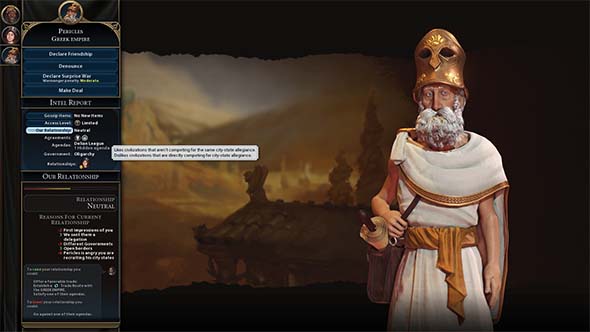
Each leader has multiple agendas, and you can acquire intel about them passively or through active espionage.
This doesn't mean that there's nothing new or worthwhile in the diplomatic department. In addition to the inclusion of an actual espionage system this time around (mostly copy-pasted from Civ V: BNW), you can also gain information about rivals through more passive means and by interacting with them. Active espionage, embassies, trade routes, and religion are all pathways to uncovering intel about a rival, including potentially their short and long-term agendas.
The espionage system itself is also improved, though I'm still not entirely happy with how it all works. I like that you have to actually construct your spies this time around, instead of them being automatically given to you for free. This means that espionage is an actual investment that you have to make instead of something that the game just hands over to everybody (as was done in Civ V: Gods & Kings). I'm less happy with the actual espionage interface.
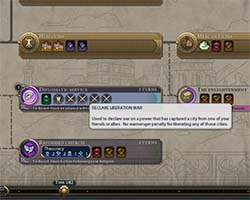
Casus Beli aren't unlocked until
midway through the game.
Each A.I. leader now has a pair of agendas. One is a baked-in trait of the character that never changes and is publicly-known from the start (such as Teddy Roosevelt's "Big Stick" agenda). The other is a random, secret agenda that also influences how that A.I. approaches the game. Uncovering this hidden agenda can potentially reveal that leader's end-game objective, and might give you insight into how best to manipulate, befriend, or beat them.
From game to game, this can also create some very interesting dynamics between the various A.I. civs. Their very personalities can interplay with each other in ways that seem much more dynamic and robust than in the previous games. This can lead to conflict, or to strong alliances. Sadly, some of these agendas can lead to A.I.s suddenly denouncing or hating you because of some obnoxious technicality. This can lead to conflicts and surprise war declarations that are as stupid or stupider than anything that the A.I.s would do in previous games. From game to game, the A.I.s will swing wildly between feeling like dynamic and robust agents, or every action feeling like complete nonsense. There's a new Casus Beli mechanic that allows you to declare war on a rival who you've previously denounced and receive less of a warmonger penalty, but it feels more like weak lip service than a genuinely useful mechanic. Most of the Casus Beli options don't become available till more than halfway through the game. More importantly, you still can't provide a specific reason for denouncing someone, and so you can't try to influence a rival's behavior in order to avert a war.
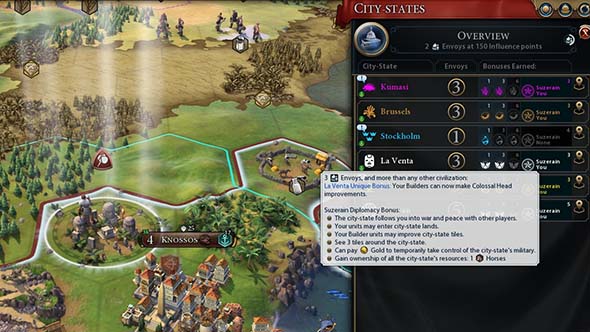
Each and every city state has a unique bonus that it confers to its strongest ally.
Even though diplomacy with other civilizations doesn't feel like as much of a breakthrough as I might have liked, I do like the changes made to city states. First and foremost, relations with city states aren't made by simply bribing them anymore. Further, each and every city state has its own uniquely themed bonuses that they award to their most loyal allied civilization - along with each city state having its own unique flag icon. This provides even more variety within the game, as different combinations of city states will enable different strategies, and it gives each city state a more defined personality that was simply lacking in Civ V.

Each great person has unique abilities.
In addition to each city state having unique bonuses, each and every great person also has their own unique abilities. Great people are also awarded differently this time around. The new mechanic reminds me of the Founding Fathers of Civilization IV: Colonization, in that there is a single, shared pool of great people available (one of each type), and all civilizations compete for recruiting that great person. If you don't like a specific great person's abilities, you can pass on that great person and save up your recruiting points for a [hopefully] better one. As the game progresses through the eras, new great people (each showing up in their own respective, real-life era) will have progressively stronger abilities.
The rat race of nations
I could say that I'm disappointed in how diplomacy turned out, but since this is something that Civ (and video games in general) have always had problems with, it was kind of expected. If there's one thing that genuinely disappoints me about Civilization VI, it's that the game doesn't quite live up to the humanist optimism of its announcement trailer. I've said before that I absolutely love this announcement trailer for Civ VI - in fact, I'm disappointed that it doesn't appear as the game's intro cinematic. Once again, let's watch the trailer and review what it actually says:
The announcement trailer for Civilization VI celebrates the collective achievements of all of humanity.
Here's Sean Bean's narration in its entirety:
"We are the explorers, the inventors, the architects of change, the builders of a better tomorrow.
We strive, we dream, we inspire, always towards something greater.
All the odds we defy, the risks we take, the challenges we endure, only make us stronger.
There's no end to our imagination, and no limit to civilization."
- Sean Bean narrating Civilization VI announcement trailer
Notice the emphasis on plurality - the use of the words "we" and "us" and "our". Whereas the previous games' trailers focused on the achievements of a single civilization, this game's trailer celebrates the collective achievement of all of humanity. It isn't about one civilization; it's about all of civilization. Civilization has always been an optimistic series that revels in the achievements of humanity, and looks at our species (and its future) with the same rose-tinted glasses that Star Trek sees humanity through, and that's one of the things that I've always loved about Civilization. Unfortunately, the spirit of cooperation, unity, and globalism that is celebrated by the trailer isn't exactly representative of the final game.
The victory conditions have changed a little bit (in mostly good ways), but they still suffer from a fundamental limitation (not exactly a "flaw", but a limitation): they are all still mutually-exclusive victories that only one civ in the game must achieve at the expense of all other civs. These victories are very nationalistic and self-serving. I've mentioned before that I feel that this victory paradigm does disservice to the game's diplomacy mechanics, since diplomatic partners never truly have each other's best interests in mind. Your trade partners and allies are just an ends to a means to prop up your own victory, at their expense. Maybe expansions will allow for some kinds of shared victories or coalitions that would allow for civs to genuinely keep each other's best interests in mind. Fingers crossed.
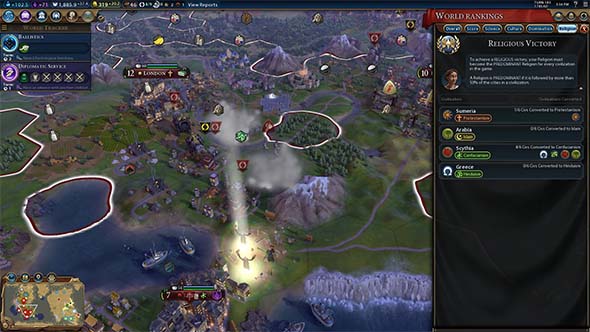
Not founding your own religion can make you a bystander to everyone else's religious battles and victory endeavors.
There is one new victory type. The Diplomatic U.N. victory has been replaced by a Religious victory. This victory is a bit weird though, since it's the only victory type for which civs can be completely disqualified at the beginning of the game. If you don't found a religion, you can't contend for a religious victory. That doesn't mean that you should neglect religion though, since you might still need to build holy sites to train missionaries and fight against the dominant religions. That is, if those dominant religions don't end up being the ones in your cities, in which case, there is literally nothing you can do to stop another player's religious dominance.
The best vanilla Civ release to date
There's a bunch of other minor, nit-picky complaints. The camera whipping from unit to unit is obnoxious. There's no production queue for cities. Pulling governments and policies out into their own tree means that the tech tree is disappointingly sparse and linear, yet there's still "dead techs". Some unit upgrade paths and promotions are iffy. Barbarians seem a bit to omni-present at the very beginning of the game. A.I. leaders seem exceedingly antagonistic when they first meet me, and players still don't have the ability to request that they move their units away from your borders! Naval units still can't heal outside of friendly territory, which makes early naval units feel worthless as anything other than defensive units. And then there's some balance and interface stuff that will likely get adjusted in patches. It is, admittedly, difficult to tell if any of these will evolve into more endemic problems.
These complaints seem like relatively tiny pin-pricks in what is otherwise and exceptionally-compelling game. This game is still brimming with humanity. More great people, each with more unique abilities tailored specifically to that individual's accomplishments in the real-world; more emphasis on culture and the arts; mechanics that revolve around the idea of a society's specific experiences and geographic situation shaping that society's technological and cultural development; more mechanics that focus around the happiness and health of the people that make up our empires; and leaders with more distinct personalities and even specific personal goals and agendas. Civilization VI fulfills almost all the promises of the series as a concept and pulls it all off with delightfully artistic flair. It might be the best vanilla release of any Civilization title to date, and I love it!
Now I'm going to go play one more turn. Just one. I promise...
